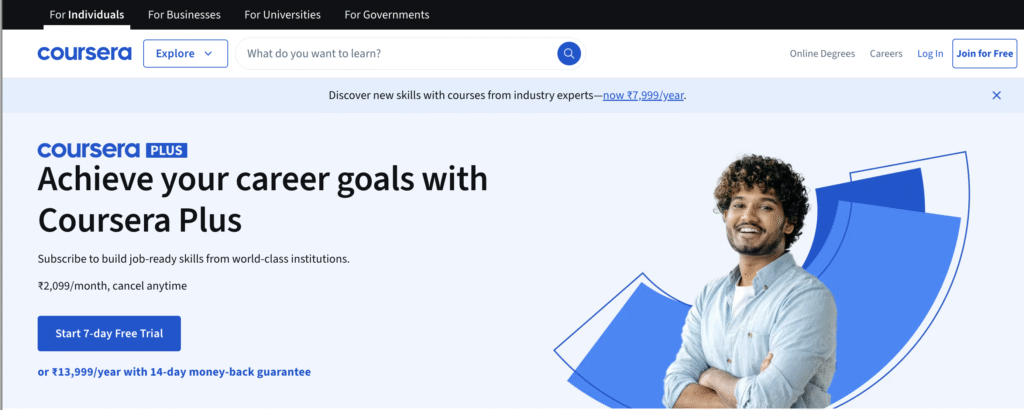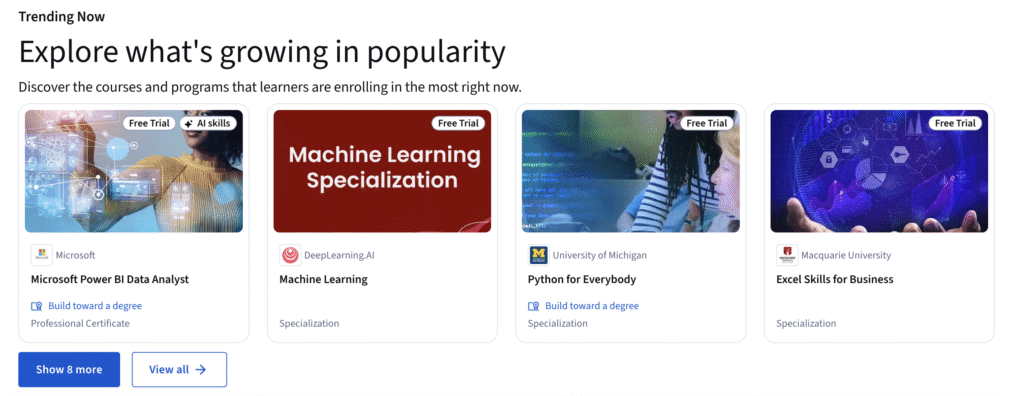
Online learning has evolved rapidly over the past decade, and Coursera has stood at the forefront of this educational revolution. Launched in 2012 by Stanford professors Andrew Ng and Daphne Koller, Coursera began with a simple mission: to provide universal access to world-class education. Fast-forward to 2025, and Coursera has grown into a global platform boasting over 125 million learners, thousands of courses, and partnerships with some of the world’s most prestigious universities and institutions.
But in a world where online learning platforms are popping up everywhere—Udemy, edX, LinkedIn Learning, Skillshare, and more—the question remains: Is Coursera still worth your time and money in 2025?
Let’s dive deep into a comprehensive review covering features, pricing, learning quality, certifications, and alternatives to help you make an informed decision.
1. What Is Coursera?
Coursera is a Massive Open Online Course (MOOC) platform that partners with over 300 leading universities and companies—including Stanford, Yale, Google, IBM, Meta, and the University of London—to offer a wide range of online learning programs. These include:
- Individual Courses
- Specializations (a series of related courses)
- Professional Certificates
- MasterTrack™ Certificates
- Online Degrees (Bachelor’s and Master’s)
- Guided Projects
The platform caters to all levels of learners—from beginners exploring new fields to professionals upgrading their skills or pursuing accredited degrees.
2. What’s New on Coursera in 2025?
In 2025, Coursera has introduced several new features and trends that improve the learner experience:
✅ AI-Powered Learning Paths
Coursera now uses AI to personalize your learning journey. Based on your career goals, interests, and past experience, it recommends curated pathways to reach your goals faster.
✅ Offline Access and Enhanced Mobile App
With improved mobile functionality, you can download entire courses for offline access, take quizzes, and even submit assignments—all from your phone.
✅ Hands-On Learning with Real Tools
Many technical and coding courses now include browser-based labs or virtual environments where you can practice using tools like Python, Git, SQL, and cloud platforms directly—no software installation needed.
✅ Job-Ready Skill Badges and Employer Partnerships
Courses often come with shareable badges or LinkedIn credentials. Coursera also works with employers through its Career Academy, helping learners match with job openings or internships directly through the platform.
3. Types of Courses on Coursera

Let’s break down the major types of offerings and who they’re best for:
📘 Individual Courses
These usually last 4–6 weeks and are great for learning a specific skill or topic (e.g., “Introduction to Data Science”).
🧩 Specializations
Bundles of related courses that provide deeper expertise in a subject. Includes hands-on projects.
🎓 Professional Certificates
Designed by companies like Google, Meta, IBM, and Intuit to prepare you for specific jobs like Data Analyst, UX Designer, or IT Support Specialist.
🧑🎓 Online Degrees
Fully accredited bachelor’s and master’s degrees from top universities (e.g., Master of Computer Science from University of Illinois). These are more expensive but a fraction of on-campus costs.
🛠️ Guided Projects
Short (2–3 hour) hands-on tasks that let you learn a skill by doing (e.g., building a simple Python script or setting up a social media campaign).
4. Quality of Content and Instructors
One of Coursera’s biggest strengths is the high quality of instruction. Unlike many open platforms, Coursera’s content comes from world-renowned universities and top-tier companies. You’re often learning directly from:
- Ivy League professors
- Tech industry experts
- Thought leaders in AI, business, health, and more
Courses are academically rigorous, well-structured, and often include:
- Video lectures
- Reading materials
- Quizzes and assignments
- Peer-reviewed projects
- Discussion forums
📚 Bonus: University-Backed Curriculum
Because many courses are adapted from real university syllabi, you get an authentic educational experience, often taught by the same professors who teach on-campus students.
5. Pricing in 2025: How Much Does Coursera Cost?
Pricing on Coursera varies depending on what you’re looking to study. Here’s a breakdown:
| Program Type | Cost (Approx.) |
|---|---|
| Individual Courses | Free to audit / $49–$99 for certificate |
| Specializations | $39–$79/month (subscription) |
| Professional Certificates | $39–$99/month (subscription) |
| Coursera Plus | $399/year or $59/month |
| Online Degrees | $9,000–$25,000 (varies by school) |
💡 Coursera Plus
A Coursera Plus subscription gives you unlimited access to 7,000+ courses, certificates, and specializations. It’s ideal if you plan to take multiple courses throughout the year.
6. Is Coursera Really Free?
Yes—and no.
- You can audit many courses for free, which gives you access to video lectures and some readings.
- However, to unlock graded assignments, earn certificates, and access full features, you need to pay.
Tip: You can apply for financial aid on most paid courses if you genuinely cannot afford them.
7. Do Coursera Certificates Matter in 2025?
Coursera certificates are not equivalent to a university degree, but they hold real value—especially when they come from:
- Recognized institutions (e.g., Stanford, Yale)
- Major corporations (e.g., Google, Meta)
They are great for:
- Strengthening your resume
- Demonstrating commitment to skill development
- Showcasing expertise on LinkedIn or to potential employers
While not all employers treat Coursera certificates as formal credentials, in industries like tech, marketing, and business, they are often accepted as proof of skill.

